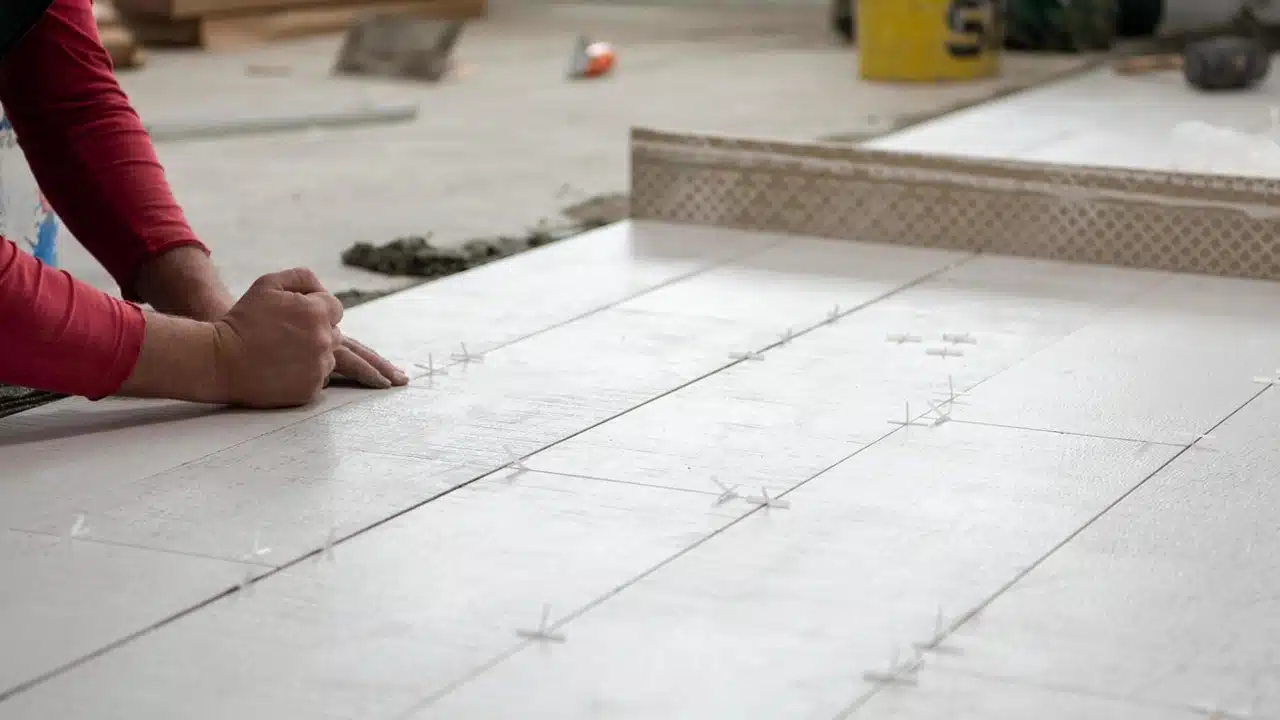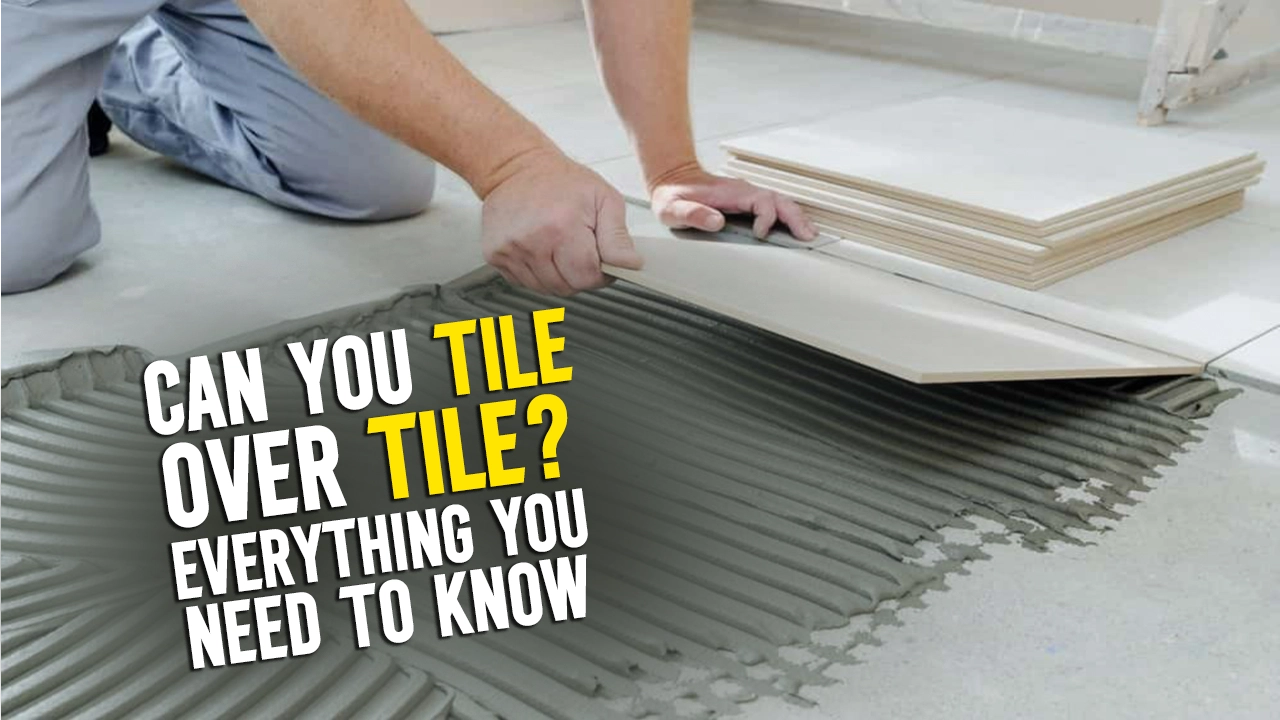Many people ask the common question: Can you tile over tile? Perhaps your old tiles are rather outdated. Perhaps you do not wish to have all the mess to change your look. The positive aspect is yes, sometimes you can put new tiles on old ones. However, there are some rules and pieces of advice for it to be done in a proper manner.
We will explain explicitly in this blog post. This is where you will know when to tile over tile and when to use veneer over tile with problems, and how to do this in steps to complete.
Why Would You Tile Over Existing Tile?
It saves a lot of work tiling over tile because there is no need to remove or break the old tiles. This achieves less dust, less time, and less cost. That’s great if your tiles are strong and just homemade or boring-looking.
Take, for example, your bathroom floor is solid but you do not like the color, you can just put new tiles right on top. This saves time and money. Also, if the tile is stuck well and the surface is flat, it can work just fine.
Many people also choose this method in kitchens and entryways, where removing old tile is hard and loud. Thus, you can lay tile over tile and it can be a smart move, if you do it right, however.
When You Should Not Tile Over Tile
This sounds easy, but tiling over tile is not the ideal option every time. Don’t tile on top of the old tiles if they are loose, cracked or uneven. The tiles will not stay in their place for long. Also, if the water damage is under the tile, then that’s a big problem later.
Another problem is weight. Tile is heavy. Adding a second layer of tile makes the floor even heavier. However, not all floors can take this. For walls, however, the problem is much worse. It is always important to check if the wall or floor is strong enough.
Height is something else they would also need to consider. When you add a new tile on top of the old one, the floor level goes up. Besides making doors hard to open or gaps between rooms, this can create small steps between rooms.
If any of these problems are there, it’s better to remove the old tile before installing new ones.
What to Check Before You Begin
The first thing is to ask yourself a few important questions before you start.
Are the old tiles strong?
Press down on them. Tap them gently. If they move or make a hollow sound, they are not safe to tile over.
Is the surface flat and even?
If the tiles are bumpy or not level, your new tiles will not look good or stay put.
Can the surface hold the extra weight?
Two layers of tile can be too heavy, especially on upper floors or weak walls. Ask a professional if you’re unsure.
Will doors still open and close?
Measure the new height. Make sure you do not block any doors or appliances.
How to Prepare the Surface
Now, if everything looks okay, it is time to make the surface ready. This step is very important. Preparation for good looks and longer life for the new tile.
- Clean the old tile:
Use a good cleaner to remove all dirt, grease, or soap. Let it dry completely. - Roughen the surface:
For this purpose, you use sandpaper or a grinder to scuff the tiles. It also helps the new tile glue better. - Fill in any cracks:
Use filler to fill any small holes or gaps. - Make sure it’s dry and level:
Check the surface using a level tool. If you need, apply a thin layer of levelling compound.
Step-by-Step Guide to Tile Over Tile

To get the best results when tiling over tile, here’s what to do:
Step 1: Get your materials
You will need:
- New tiles
- Tile adhesive or mortar
- Grout
- Tile spacers
- Notched trowel
- Sponge
- Level
- Rubber float
Step 2: Apply the adhesive
Apply tile adhesive using the notched trowel on a small section. It’s not recommended that you do the whole area at a time and work in small sections instead.
Step 3: Lay the tiles
Place each tile firmly into the adhesive. Use spacers to make lines even between tiles. Check often with a level to make sure the tiles are flat.
Step 4: Let the tiles set
Let the tiles dry completely by waiting 24 hours.
Step 5: Add grout
To clean the excess grout, use a damp sponge. Be light with your hand and do not pound on him too much.
Step 6: Clean off extra grout
If there is extra grout, you should clean it using a damp sponge. Don’t press too hard, be gentle.
Step 7: Let everything dry
Let the grout dry fully. This may take another 24 hours. Once your floor is done, your tile floor is ready for use.
Can You Tile Over Tile in a Shower?
Yes, but be extra careful. All the old shower tiles must be washed clean and dry and then sealed. Small cracks allow water into them and they can cause mold, or else they can cause some kind of damage. Use waterproof glue and sealant. Old tile should be removed if there are signs of leaks or soft spots.
What Are Some Other Options?

Other options exist if you do not want to tile over your tile.
Peel and Stick Tile
These are quick and easy. Just peel off the back and press them down. On flat, clean tiles, they work best. However, this won’t take as long, particularly if the area is wet.
Laminate Flooring Over Tile
You can lay laminate over tile if the surface is level. An underlayment is the best choice to achieve the best results. This is common in bedrooms and living rooms.
Carpet Over Tile
You can install carpet over tile with padding. It gives warmth as well as comfort, especially during cold homes.
Painting Over Tile
Tile painting, especially on the wall, is an ideal way. Use special tile paint. Clean and sand the surface before painting. This is a cheap and fast way to change the look.
Final Thoughts: Should You Tile Over Tile?
Thus, can I tile over existing tile? However, this is only if the old tile is likewise strong, flat, and clean. This method can be used to save some time, money, and effort. However, it is not a solution for every single situation. First, remove the old tiles if they are cracked or weak.
Always check the condition of the surface. In terms of safety, focus is placed on height, weight, and water safety. So if all is well, you can enjoy a newly tiled floor with no destruction.
FAQ’s
Yes, if the old tiles are in good condition and dry.
Yes, vinyl planks or sheets can go over tile if the surface is even.
Yes, you should use padding and glue to achieve a smooth result.
Yes, with special tile paint, after cleaning and sanding.
Yes, but only on flat and clean tile. It’s good for small or quick projects.


